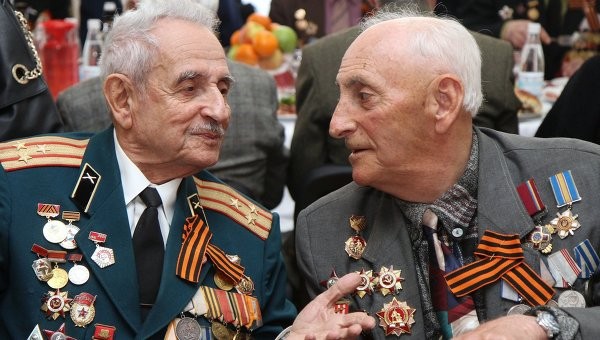
The Soviet role in the defeat of Nazism must never be forgotten
The 70th anniversary of the end of the second world war in Europe will this week be commemorated in towns and cities across the continent. On this occasion, the celebration will be especially poignant. It will probably be the last important Victory Day anniversary involving veterans and survivors of the conflict, men and women who bear direct witness to its horror. What will also be unsettling is that it arises at a moment of acute diplomatic tension between Russia and the west.
Nowhere will east-west divisions be more apparent than in Moscow itself. Ten years ago, at the 60th anniversary of the end of the Great Patriotic War, as it is known in Russia, the leaders of the US, France and Germany joined President Vladimir Putin for the May 9 victory parade in Red Square.
This year, they and other western leaders will be absent. Mr Putin is likely to use the occasion to aggrandise his regime after its seizure of Crimea and its incursion into eastern Ukraine. Western leaders have made clear that they do not want to be part of the show.
Anyone contemplating the scale of suffering in the second world war is bound to regret their absence from Moscow on Saturday.
The Soviet Union lost more than 20m citizens and its role in defeating Nazi Germany was greater than that of any other state. The number who died in the siege of Leningrad exceeded the total losses of British and US forces combined in the entire war.
The battles of Stalingrad and Kursk were turning points of the conflict. Russia’s role was central and critical and this should never be forgotten by historians.
The 70th anniversary ought also to be a moment when the world comes together — not only to honour those who gave their lives to defeat Nazi tyranny but to recognise the difficult moral lessons of the conflict. The world did not prevent the Holocaust of European Jewry. The saturation bombing of Hamburg and Dresden was excessive. The Red Army committed hideous war crimes, notably the destruction of the Polish officer corps at Katyn. The second world war was not the simple tale of good defeating evil that is often served up.
Yet the absence of western leaders from Moscow, while regrettable, is understandable. Mr Putin’s annexation of Crimea and his incursions into Ukraine are the first redrawing of the map of Europe by force since the end of the cold war.
Russian aggression in eastern Ukraine has been contained but it has not been stopped. This makes any show of western solidarity with Mr Putin impossible at present.
The likely tone of next week’s celebration in Moscow would also make western leaders uncomfortable. Russian state propaganda repeatedly links the victory against Nazism with recent events in Ukraine, describing the pro-European Ukrainians who toppled President Viktor Yanukovich as fascists and Nazi collaborators. The May 9 commemoration in Red Square is unlikely to show restraint in using history as a propaganda weapon.
At this solemn moment, the west’s leaders should take the opportunity to declare that whatever differences they have with Mr Putin, they have none with the people of Russia.
Mr Putin may wish to use Victory Day as an exercise in militaristic posturing that puffs up his regime. But the millions of Russians and other former Soviet peoples who fought heroically to rid the world of Nazism deserve better.
In Russia and beyond, they should be honoured for the extraordinary sacrifices they made — and for no other purpose.

 May 5, 2015
May 5, 2015  Опубликовано в
Опубликовано в